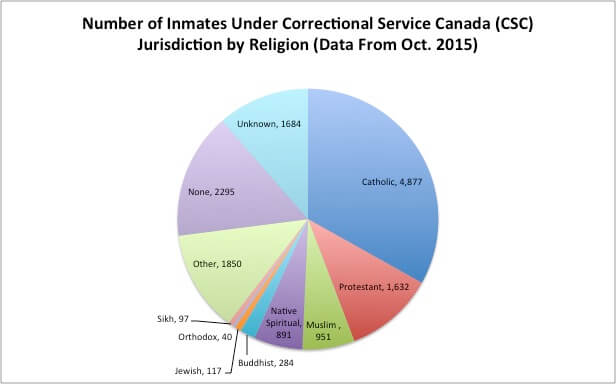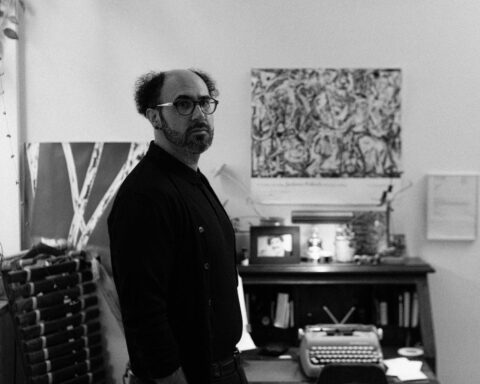Religion can be a key element in the rehabilitation of inmates. However, for minorities, changes to prison chaplaincy services during the Conservative government made following their faith at federal prisons a challenge.
For this reason minority community leaders are calling on the new government to engage in the issue. Currently, human right tribunals are listening to three religious discrimination complaints from Muslim inmates.
For Amira Elghawaby, Communications Director for the National Council of Canadian Muslims, these complaints confirm the concern of minority communities regarding chaplaincy services.
“The service is spotty at best, discriminatory at worst,” she says.
“The service is spotty at best, discriminatory at worst.”
“The government is aware of the concerns surrounding this important issue in federal corrections,” states Josée Sirois, a spokesperson for the Liberals’ new minister of public safety, Ralph Goodale, in an e-mail. Sirois added that the minister would prefer to be fully informed before commenting any further “given the complexity of the issue.”
[youtube height=”315″ width=”560″]https://www.youtube.com/watch?v=bfDQp3G198w[/youtube]‘No sign of systemic discrimination’
In 2012, the Liberals’ then party justice critic, Irwin Cotler, denounced cuts to non-Christian prison chaplaincy services as “clearly discriminatory,” but it is difficult to measure the real extent of the issues.
Offenders have multiple avenues to report abuses – through the internal grieving system, private council, the Office of the Correctional Investigator or the Canadian Human Rights Commission – and all these mechanisms try to first solve complaints internally, keeping information private.
In rare occasions, complaints scale up to the Human Rights Tribunal and are made public.
Sapers explains there is no sign of “directed and systematic discrimination” against religious minorities.
According to the federal correctional investigator, Howard Sapers, whose office monitors the situation of religious minorities, the problem has improved since 2012. However, Sapers says, “The situation is still far from perfect.”
Sapers explains there is no sign of “directed and systematic discrimination” against religious minorities. Complaints he occasionally receives are the fault of one key decision maker “who isn’t exercising their administrative discretion appropriately.” He adds that most of the complaints he receives are about religious diet and recognition of special religious holidays.
“It is not at the top of our [priority] list right now, because frankly the inmate population is not coming in large numbers to bring this concern forward,” he states.
Sapers says his priority is giving accessibility to inmates to submit complaints. His staff members visit prisons across the country to monitor them, and he received over 20,000 complaints from inmates last year by phone.
“I would be misleading you if I told you we are getting every single complaint, and that every inmate feels they have access to legal recourses. That is not true,” says Sapers.
Minority groups falling through the cracks
Karen Slaughter, a staff lawyer with West Coast Prison Justice Society, shares Sapers’ concerns.
“There is a possibility for religious minority groups to fall into the cracks,” explains Slaughter.

She adds that ethnic community groups are receiving more and more complaints from inmates about religious discrimination and this is concerning because these groups don’t have the funding or the resources to prepare litigations on behalf of individuals.
Slaughter says her organization has heard all kinds of religious complaints from Muslim, Jewish and Sikh inmates, however, never from Christians.
“Religious minorities feel like second class citizens inside the prison system.”
“Religious minorities feel like second class citizens inside the prison system,” she says, pointing to a lack of education and resources as the main problem.
Slaughter says correctional services are a giant bureaucratic machine and change can only come from the top. She hopes the new government will implement some of that change.
For Sapers, the new government could improve a few things with the correctional service system. One of his concerns is that some religious groups provide support, counselling, guidance and reintegration services on a voluntary basis.
“It is not entirely fair that some groups are paid for their services and others are [not],” says Sapers.
He also called on the government to do an external review to ensure that the terms of the contract with private company, Kairos Pneuma Chaplaincy Inc., which provides the services is inclusive enough, so no one feels excluded. In April 2016, this contract will be taken over by Bridges of Canada Chaplaincy.
Religion’s role in rehabilitation
Mubin Shaikh, an expert on radicalization and extremism, urges the government to improve the situation because without proper religious direction individuals could be more prone to radicalization, as seen in Europe. A religious practitioner without proper guidance “is like driving a car without brakes,” he says.
A religious practitioner without proper guidance “is like driving a car without brakes.”
Yasin Dwyer, a former federal correctional imam, says that the situation in the prisons is “delicate.” He worked for over 12 years in the federal prison system until last year he renounced in protest to the Conservative government’s decision to privatize the chaplaincy services at all prisons.
According to Dwyer, chaplaincy services are important because they provide a positive environment for prisoners to express themselves and can help prisoners in rehabilitation.
The imam explains that one of the most important aspects of religion is that it allows inmates to connect with the community through volunteers.
“The prison has walls, but [these] walls are [imaginary] because these prisoners are part of our community,” says Dwyer.
This is important as 90 per cent of prisoners in the system will eventually return to society, Dwyer says. It is also why he stresses the need for the new government to take the role of minority religious communities in the prison system seriously.
As Dwyer notes, “Prisoners need a community to come back [to].”
Video produced & edited by Daniel Leon Rodriquez for New Canadian Media.




